Good evening Jordan, it's Sunday and this series comes to you in at least 3 parts. We'll see how long these posts get with the preposterous amount of pictures we were taking. Now, I can say that I started my post on the day we bot back. I will have to take a day or two organizing and editing pictures, so I'll be right back. Promise you won't even know I've left.
See?
Bueno
As has been the ongoing theme for a while now, our planned vacation spot was Peru. This would be attempt #3 to go eat lomo salteado and hang out with alpacas, but as we were starting our initial planning phases, Macchu Picchu was closed down due to protests. With that being such a center piece of a Peruvian plan, we decided to hold off. again. However, we decided to keep it to the same continent. Our highest rated spot was Argentina (yes, we have solo and combined updated top 15 vacation destinations lists) and Gabriel had gone there the year before, giving us some good ideas. I was in school through the end of March, so our anniversary trip was going to have to wait until a few days after our anniversary this year.
For trip planning, I always start with what we both "have" to do. This trip, the must haves were Buenos Aires, the southern tip of the continent, and the Iguazu Falls in the tri-border region. I decided against the Rick Steve's books that were so helpful in last year's trip to Turkey and Greece and decided to build the trip using Visit a City, Gabriel's tips, and plain ole Googlin. It turned out pretty well but I'll get into some big mistakes I made that might have been avoided using a guidebook.
Another tool in my planning toolbox was the show Street Food:Latin America. The first episode goes around Buenos Aires taking viewers to different spots for, believe it or not, street food. I used this episode to try and pick out some of our places to grab meals as they fit with the flow of our days.
Since Argentina's such a large country, about twice the size of Alaska, we would have to spend some time in airports if we wanted to bounce around so much. Unfortunately, most of those flights would be overnighters, changing the complexion of the trip. Our first flight left on the afternoon of the 1st, took us to Atlanta, then a 9 hour overnight flight to Santiago de Chile while sitting by a snorer with someone near us ripping off farts that would choke a cow. After surviving that, we whipped through customs, grabbed a coffee, waited an hour or so, and then on to Buenos Aires.
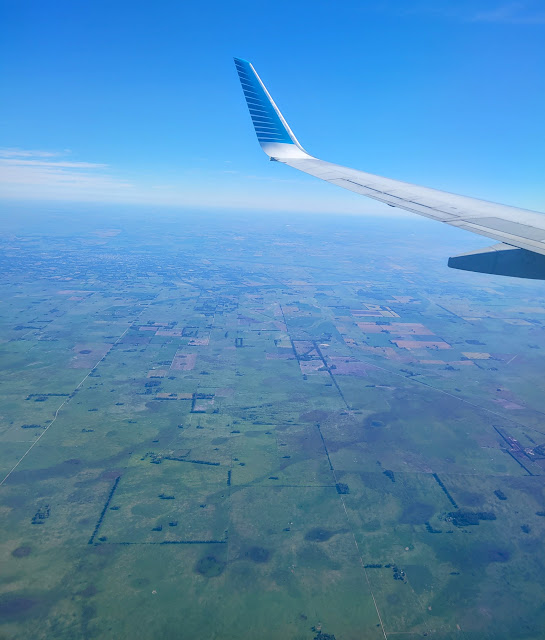 |
| countryside just west of the city |
 |
| First views of the city |
 |
| Downtown and the Rio de la Plata |
Unfortunately, Argentina doesn't stamp passports. With a mission of quickly getting to the hotel, changing, and heading back out the door for lunch, we found out how surprisingly cheap Uber is. (somewhere around $9 for a trip from the airport to the hotel a few miles away) Most of Buenos Aires' urban center is actually located in the East to North East as the city grew up from the banks of the Rio de la Plata.
 |
| On the bus that took us from the tarmac to the terminal. The first of many homages to Maradona and Messi |
We stayed at Hotel Regente Palace. Honestly, if I like something, I'll link it. I was unimpressed to say the least. The room was mostly clean but hadn't changed since the 1970s. They left the window cracked open in the bathroom with a broken frame so that it was impossible to close. Then, we noticed the first mistake I'd made. The outlets were different. They weren't US or European, they were flat and at an angle. Shoot. I was able to buy a plug head with a couple USB ports but that thing would only occasionally work. And, only about half of the outlets in the hotel room worked anyway.
 |
| Lovely view from the room |
The first official planned stop was an empanada joint called El Kiosco de Fabi that I saw on that TV show. We jumped in an Uber, he took us to where Google Maps told us to go and we saw nothing. The driver, curious as to why we'd want to be dropped off on a side street lined with shuttered shops, asked what we were looking for. He hadn't heard of that spot but sent us a couple blocks away to find food.
 |
| the first of many. and yes, Argentinians eat pizza with a fork and knife. like maniacs |
We stopped at a local pizza place and found a couple more things I'd overlooked. First, tipping is never paid for by card. You have to pay in cash. Also, they rarely accepted US dollars, as we'd been led to believe. We also learned something we didn't know about the people. Our waiter was amazing. More than that, he was honest. He thought we were about to make a mistake and overbuy. He took the time to explain what we should really do so that we didn't spend more than we needed to. This was just the first time we had this type of experience.
After eating some really good pizza, we had sight seeing to do. Since our hotel was centrally located, we were walking distance from many of the city highlights.
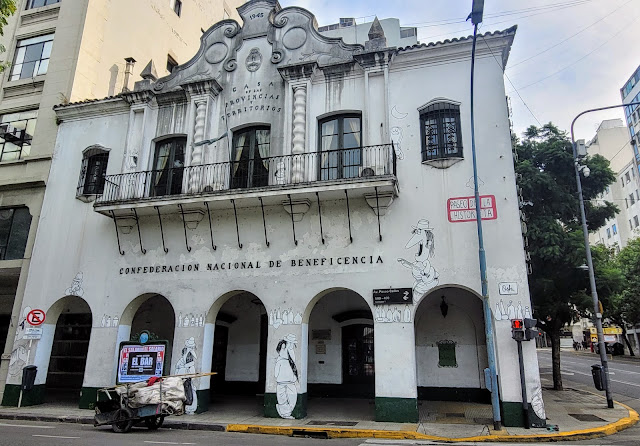 |
| Buenos Aires is full of great street art (and it's fair share of politically-charged graffiti). this was just the first good example of street art that I saw |
 |
| A statue of Juan Domingo Peron, the historically polarizing president that accepted escaping Nazis inside Argentinian borders, pushed (along with his wife Evita) social reform, was overthrown in 1955, was accused of statutory rape (which is doubtful to have occurred but the rumors were rampant), and came back to the presidency in 1973. The country is full of homages to him and populist politicians are still referred to as "Peronistas" |
This statue was finished in 2019 and is located in the General Agustin Pedro Justo plaza. To show how polarizing he is, he was buried in a public ceremony but later had his gravesite desecrated, with someone chain sawing his hands off and stealing his sword. An $8 million ransom note was sent to supporters but never paid. Instead, his remains were moved to a mausoleum at a museum dedicated to him.
We walked along the green plazas filled with sculptures and running in front of impressive government buildings.
 |
| we tried so hard to get a picture with the flag unfurled but it just wasn't windy enough |
 |
| Their version of the Pentagon |
 |
| The first of many Malvinas/Falklands memorials. I'll be doing a full post on the war and what we saw so I won't be putting too many pictures of them in these posts |
Our first day was dedicated to the government buildings, many of them situated around the Plaza de Mayo. You could see the European influence all around as Argentina has long identified itself as a geographically-separated European nation. A large part of that is the large population made up of European descent, especially in comparison to other South American nations. Physically, I fit in just as well if not better than Mila and most people defaulted to speaking to me in Spanish. (our taxi driver buddy Daniel said my movements gave me away as American though)
 |
| Still smiling after 24 hours of traveling and touristing |
The focal point of the Plaza de Mayo is the Casa Rosada, Argentina's pink presidential palace. Honestly, we weren't initially sure what it was because we came around the back side.
Not seen here is the Veterans of the Malvinas display off to the left. Several veterans and their families gathered in remembrance of the war on the 42nd anniversary of the initial invasion. I should have realized it as I had literally turned in a 12-page paper about the war two days beforehand. The day is now commemorated as Memorial Day which explains why the streets were so empty and so many storefronts were shuttered. I felt more optimistic about Buenos Aires when I realized that stores were closed due to the holiday.
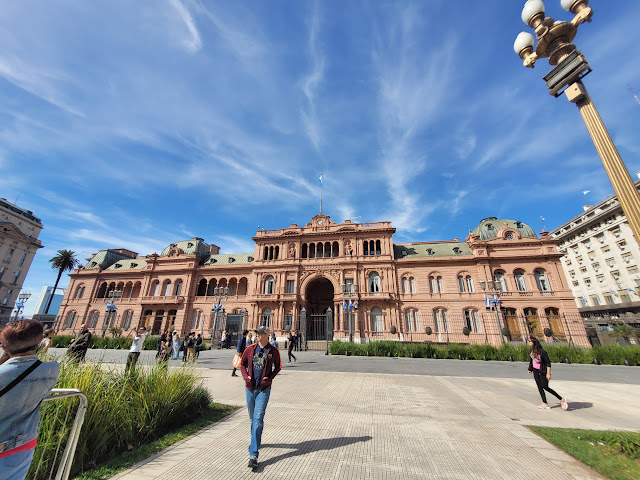 |
| I promise this was candid |
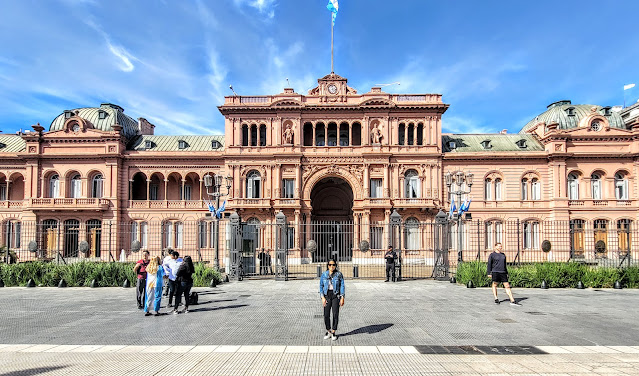 |
| this, on the other hand, was not candid |
While the Casa Rosada museum is free, we showed up just a little late and didn't get a chance to go through. Here's a fun fact: although the building has been used at the presidential estate for over 160 years and was the site of the famous balcony proclamations of Juan Domingo and Evita Peron, only one president has actually lived there. However, it is the site of the presidential offices.
Directly in front of La Casa Rosada is this statue of General Manuel Belgrano. Belgrano is one of Argentina's founding fathers, fought in the War of Independence, and designed the flag. Across the country you see the name Belgrano everywhere, from streets, to soccer teams, to warships.
 |
| OK, there's a shot with the flag mostly unfurled |
To celebrate the first anniversary of their May 25th 1810, Independence, the primera junta commissioned a pyramid to be built. Then, 50 years later, the pyramid was rebuilt and capped with Liberty (I incorrectly thought it was Athena/Minerva), the allegorical representation of Argentina. This was the first national monument in the country.
 |
| On the opposite end of the plaza sits the Cabildo, the original site of local colonial power. It was closed for the holiday but we were able to tour it later in the trip. |
Next to the Cabildo is the Metropolitan Cathedral of Buenos Aires. Unbeknownst to us, it holds the tomb of Argentine Founding Father General San Martin and the tomb of the unknown soldier. The original cathedral was built 1580. Today's cathedral was started in the mid-18th century but wasn't fully finished for a century. Plenty of Italian and French architects and craftsmen shared their handiwork. Another fun fact, the current pope, Pope Francis, was the bishop and held mass here for 15 years before moving to Rome.
 |
| the nave from the entrance |
While we were there, the large group of veterans that we had seen in front of La Casa Rosada showed up, just in time for a changing of the guard.
I took a video but unfortunately it's too large to post

Known for its eclectic style and the fact that it was once the tallest building in South America, this just over 100 year-old building stands at exactly 100 meters tall. The lobby still maintains the original vibes, but we didn't want to spend the money for a tour, especially since it was almost closing time. This was one of the sites that I just trusted Visit a City on.
From here, we walked to the Congressional Plaza where, guess what, Congress sits.
 |
| While not the original Rodin, it was made from the same cast and signed by the artist |
 |
| Our first view of the Congressional Palace |
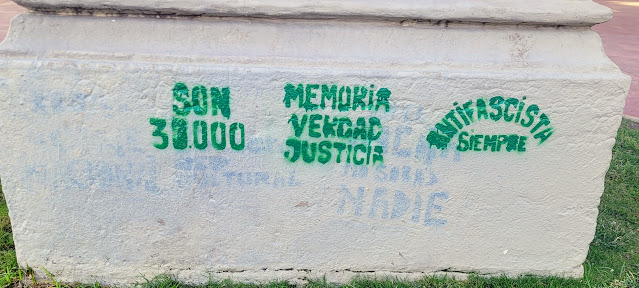 |
| stamped graffiti calling for justice for the 33,000 people disappeared during the guerra sucia |
Do you think Mila was most impressed by a) the heavy influence of French and Italian architects b) impressive government buildings c) a Rodin sculpture, among other monuments or d) how friendly portenos were to us? If you guessed e) every random bird, you truly know Mila
 |
| I was told to take this picture |
 |
| can we grab it and take it home? |
At this point, we were looking at each like
but also hungry so we decided to try some of that famous Argentine parrilla.
Mila liked this place way more than I did. We did get to try a Patagonia Red Amber here, which is probably now both of our favorite Argentine beer. We took the short walk back to the hotel and collapsed into bed.
I think I'll stop here. I had thought about trying to fit all of our first chunk in one post but that would take up way too much space. I'll cover 2-3 days in the next post, hopefully coming out in a week.








































Comments
Post a Comment